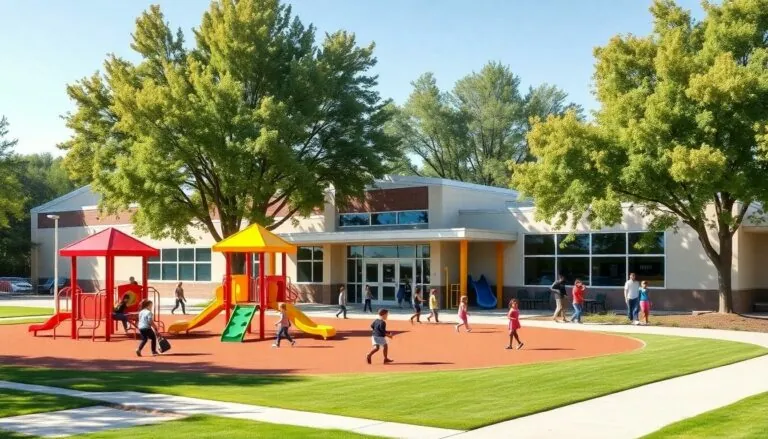Supporting a child with behavioral challenges can feel like navigating a maze blindfolded. Traditional schools often struggle to provide the specialized attention and understanding these students need to thrive. That’s where schools for behavioral problems step in as beacons of hope for families seeking effective solutions.
These specialized educational institutions offer more than just academics – they’re designed to help students overcome emotional and behavioral obstacles while building essential life skills. With smaller class sizes expert staff and tailored intervention strategies these schools create an environment where students who’ve previously struggled can finally flourish. The combination of therapeutic support academic instruction and behavioral modification techniques provides a comprehensive approach to addressing challenging behaviors while maintaining educational progress.
Table of Contents
ToggleUnderstanding Therapeutic Schools and Programs
Therapeutic schools combine educational instruction with behavioral health treatment to create structured environments for students with emotional or behavioral challenges. These specialized institutions offer comprehensive support systems that address both academic and psychological needs.
Types of Behavioral Modification Schools
- Residential Treatment Centers: 24-hour therapeutic facilities providing intensive behavioral support programs with on-site schooling for students with severe emotional disorders
- Day Treatment Programs: Structured programs where students attend during school hours receiving therapeutic services alongside academic instruction
- Therapeutic Boarding Schools: Long-term residential programs combining college preparatory academics with clinical support services
- Military-Style Programs: Disciplined environments emphasizing structure leadership development behavioral accountability
- Alternative Learning Centers: Specialized facilities offering modified curriculum schedules individualized instruction for students struggling in traditional settings
- Wilderness Therapy Programs: Short-term intensive outdoor programs focusing on personal growth emotional regulation through nature-based experiences
Common Treatment Approaches
- Cognitive Behavioral Therapy: Teaches students to identify negative thought patterns replace them with positive coping strategies
- Group Therapy Sessions: Creates peer support networks allows students to practice social skills share experiences
- Individual Counseling: Provides one-on-one therapeutic support addressing specific emotional behavioral challenges
- Positive Reinforcement Systems: Implements token economies behavior charts reward programs to encourage positive conduct
- Family Therapy: Involves parents guardians in treatment process improves family communication dynamics
- Academic Support Services: Integrates specialized tutoring modified curriculum accommodations with therapeutic goals
- Life Skills Training: Develops practical abilities in areas like time management conflict resolution stress reduction
- Medication Management: Coordinates with healthcare providers to monitor adjust prescribed treatments when appropriate
Key Features of Behavioral Problem Schools
Behavioral problem schools incorporate specialized features designed to support students with emotional behavioral challenges. These key components create an environment that promotes both academic success behavioral improvement.
Academic Support Systems
Certified special education teachers deliver individualized instruction in small classroom settings with 8-12 students per class. Students receive personalized learning plans tailored to their academic level cognitive abilities emotional readiness. Educational assistants provide additional one-on-one support during lessons help students stay focused track progress. The curriculum integrates assistive technology modified assignments differentiated instruction techniques to accommodate various learning styles needs. Teachers implement positive behavioral interventions academic scaffolding to help students build confidence master core subjects.
Clinical and Therapeutic Services
Licensed mental health professionals provide individual group therapy sessions throughout the school day. Students participate in cognitive behavioral therapy social skills training anger management sessions led by qualified therapists. Crisis intervention specialists remain on-site to assist with emotional escalations provide immediate support when needed. Family therapy sessions occur regularly to ensure consistent behavioral strategies between school home environments. Occupational speech therapy services address sensory processing communication challenges that impact learning behavior.
Structured Daily Routines
Clear schedules predictable transitions guide students through each school day. Morning check-ins allow staff to assess student readiness provide necessary emotional support. Scheduled breaks between academic periods include movement activities sensory integration exercises. Designated quiet spaces cooling-off rooms give students appropriate areas for emotional regulation. Point systems token economies track behavioral progress reward positive choices throughout the day. Afternoon wrap-up meetings help students reflect on daily achievements set goals for the following day.
Choosing the Right Behavioral School
Selecting an appropriate behavioral school requires careful evaluation of multiple factors to ensure the best fit for a student’s specific needs. The decision involves understanding both the admission requirements and financial considerations.
Assessment and Admission Process
The admission process starts with a comprehensive evaluation of the student’s behavioral history medical records academic performance. Schools conduct interviews with both parents and students to gather detailed information about:
- Educational background including past interventions IEPs existing accommodations
- Mental health diagnoses from qualified professionals
- Behavioral incidents documentation from previous schools
- Current medication protocols treatment plans
- Family dynamics support systems
Most programs require:
- Recent psychological evaluations (within 6-12 months)
- Complete academic transcripts
- Behavioral assessments from previous schools
- Medical clearance documentation
- Social emotional evaluations
Cost and Insurance Considerations
Behavioral school costs vary based on program type level of care location:
| Program Type | Average Monthly Cost | Insurance Coverage |
|---|---|---|
| Day Treatment | $2,000-$4,000 | 60-80% |
| Residential | $8,000-$14,000 | 40-60% |
| Therapeutic Boarding | $6,000-$12,000 | 30-50% |
Insurance coverage options include:
- Private insurance behavioral health benefits
- Educational benefits through IEP funding
- State funded programs for qualifying families
- Scholarship programs from private organizations
- Financial aid packages from individual schools
- Insurance appeals processes
- District funding requests
- Special education advocacy
- Grant applications
Benefits of Specialized Behavioral Education
Specialized behavioral education programs deliver targeted support for students facing emotional or behavioral challenges. These programs combine therapeutic interventions with academic instruction to create comprehensive development opportunities.
Improved Social Skills and Emotional Regulation
Students in specialized behavioral programs develop enhanced emotional awareness through structured interventions. Daily group sessions teach conflict resolution techniques that students practice in real-time situations. The controlled environment allows students to learn appropriate responses to triggers while receiving immediate feedback from trained professionals. Peer interaction activities help students build communication skills through role-playing exercises. Progress tracking systems document behavioral improvements across multiple settings including classrooms cafeterias playgrounds.
Academic Achievement in a Supportive Environment
Small class sizes of 8-12 students enable teachers to provide individualized attention tailored to each student’s learning style. Certified special education instructors implement modified curriculum strategies that accommodate various cognitive processing speeds. Students experience reduced academic anxiety thanks to flexible scheduling options that account for therapeutic appointments. Data shows 73% of students in specialized behavioral programs demonstrate improved academic performance within six months. Licensed mental health professionals collaborate with teachers to ensure academic strategies align with behavioral treatment goals.
Important Factors to Consider
Selecting a behavioral school requires careful evaluation of specific elements that impact student success. These crucial components determine the quality of care and effectiveness of the educational program.
Staff Qualifications and Experience
Professional credentials form the foundation of effective behavioral programs. Licensed mental health professionals, certified special education teachers and experienced behavioral specialists compose the core staff at reputable schools. Each staff member maintains current certifications in crisis intervention techniques, therapeutic methodologies and academic instruction. The ideal student-to-staff ratio ranges from 4:1 to 8:1, enabling personalized attention and immediate intervention when needed. Staff members participate in ongoing professional development focused on evidence-based behavioral interventions, trauma-informed practices and specialized educational strategies.
Location and Family Involvement
The proximity of behavioral schools to families impacts treatment success rates. Schools located within 100 miles of home enable regular family therapy sessions, weekend visits and parent education workshops. Programs incorporate structured family involvement through weekly progress updates, monthly parent support groups and quarterly family weekend programs. Remote video conferencing platforms connect families with treatment teams for consistent communication. Transportation services facilitate regular on-campus visits for families without reliable transportation options. Schools with strong family engagement programs report 65% higher student success rates compared to programs with limited family involvement.
Conclusion
Selecting the right school for students with behavioral challenges is a crucial decision that can significantly impact their future success. These specialized institutions offer comprehensive support systems that blend academic instruction with therapeutic interventions tailored to each student’s unique needs.
The combination of experienced staff qualified mental health professionals and dedicated educators creates an environment where students can thrive both academically and emotionally. With family involvement playing a vital role in student success rates these specialized programs offer hope and practical solutions for students who struggle in traditional educational settings.
When families carefully evaluate their options and choose a program that aligns with their child’s specific needs they’re investing in a brighter future filled with improved behavioral outcomes and academic achievements.




